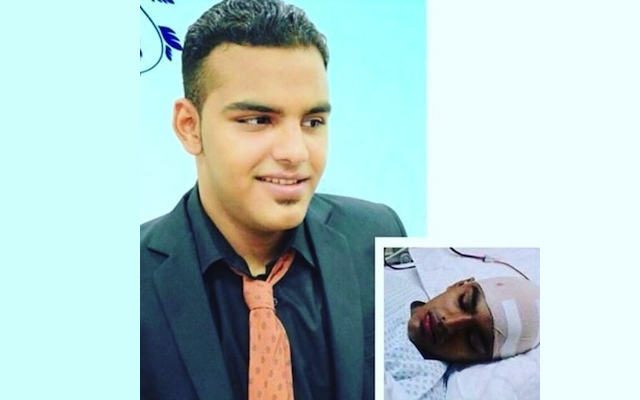Khalil Ebrahim al-Saffar is a 21-year-old Bahraini citizen who was detained on 15 September 2015 from his family’s home. Six security officers raided the house without a warrant or any explanation. The family was informed that Khalil would be returned after an hour-long interrogation; instead, he never came back home.
In CID custody, interrogators stripped Khalil of his clothes, sexually abused him, and beat him with batons and plastic cables until he lost consciousness. A skull injury he sustained years before his detention was aggravated by the torture he endured, and the room he was placed in was set at an extremely cold temperature, which intensified the severe headaches he suffered. Khalil’s health deteriorated drastically during this period, and he was eventually taken to the medical facility in the Ministry of Interior’s Qalaa complex for three days. Afterwards, he was returned to the CID and the daily torture resumed. In total he spent roughly two weeks under CID interrogation before being transferred to Dry Dock Detention Center.
At Dry Dock he was brutally beaten again and personally threatened by the cellblock warden, a Yemeni national. The security services in Bahrain are heavily staffed by non-nationals, a reflection of the ruling regime’s inability to recruit sufficient numbers of native Bahrainis whom it trusts to implement its repressive minoritarian agenda.
Khalil’s severe headaches continued while he was at Dry Dock, but the detention center’s administration denied him medical treatment. The guards stopped supplying Khalil with the medication prescribed for his skull injury, and instead switched his medication at random to pills unrelated to his treatment. As a result, Khalil fainted twice in one night and was taken to the prison clinic, but medics there accused him of faking his symptoms and refused to treat him. His condition continued to deteriorate until later that same night he was taken to Salmaniya Medical Complex. Once again, though, Khalil was denied medical treatment; he was left to suffer, while bound to the hospital bed.
Khalil was brought to trial on vague charges that ranged from joining a group “calling to dismantle the rule of the Constitution” to pursuing “plans aimed at stirring up troubles and creating chaos.” He was sentenced to a total of 20 years in prison. Khalil has asked the Jau prison administration for proper health care outside of the prison, but these basic needs have yet to be met.
Bahraini officials denied Khalil basic due process and subjected him to severe psychological, physical, and sexual torture, then denied Khalil necessary medical treatment for his previous injury and further injuries sustained in detention. The Bahraini government must ensure Khalil has access to medical treatment while he is in detention, but – more fundamentally – it cannot continue to imprison him after a lawless detention and trial. The lack of due process and use of torture have corrupted the judicial process in his case and render his current detention arbitrary and unlawful.





